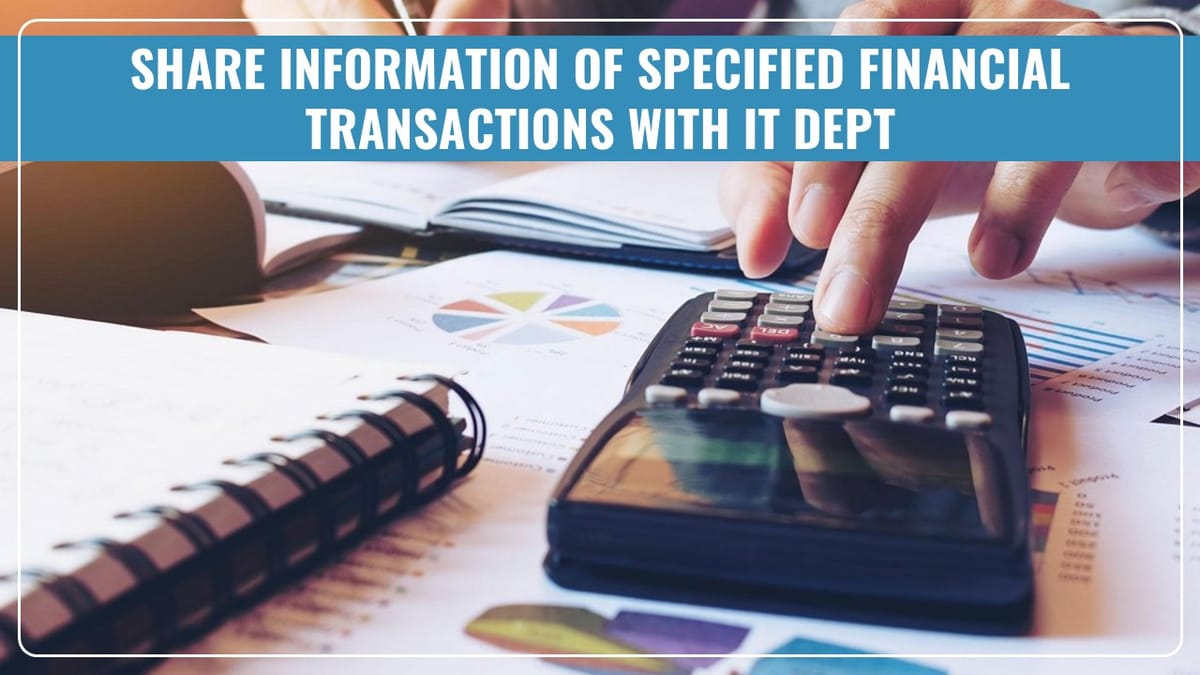IT department is considering broadening the scope of data sharing across various institutions and decreasing the threshold for reporting financial transactions below Rs. 10 lakh.
Reetu | Aug 14, 2024 |

More Institutions asked to Share Specified Financial Transactions below Rs.10 Lakh per annum with IT Dept
In its third term, the Modi government is working on additional measures to combat tax evasion and leakage.
The income-tax department is considering broadening the scope of data sharing across various institutions and decreasing the threshold for reporting financial transactions below Rs. 10 lakh.
This change is being explored for Specified financial transactions (SFTs), including interest, dividends, and capital gains. The current limit for reporting such transactions is Rs.10 lakh or more.
A senior government source said that this is part of the IT department’s overall goal to boost its e-verification process for filing taxes.
“The threshold for matching financial transactions could be reduced to gather a wider range of data. Up until today, there was a transaction restriction of Rs.10 lakh. That limit may be reduced to, say, Rs. 5 lakh,” the official said.
The current threshold for SFT reporting is defined in Table 114E of the Income Tax Act, which includes transactions involving dividends, capital gains, and interest. The information collected is used to pre-fill IT returns.
Rule 114E requires organizations, such as banks, registrars, and stock exchanges, to report 13 SFTs to the IT department.
They include cash payments of Rs.10 lakh or more for bank drafts or pay orders, as well as payments of Rs.10 lakh or more within the financial year for the acquisition of pre-paid instruments.
Furthermore, cash deposits or cash withdrawals totalling Rs.50 lakh or more from one or more current accounts, as well as cash deposits totalling Rs.10 lakh or more in a financial year across one or more accounts, excluding current accounts and time deposits, must be reported. This rule also covers other specified transactions.
The government is also considering raising the number of institutions that must submit financial data to the Income Tax Department.
“We have been looking to increase their ambit, asking more institutions to share information,” according to the official.
Banks, post offices, non-banking financial companies (NBFCs), registrars, stock exchanges, mutual fund companies, credit card issuers, depository participants, companies issuing bonds or debentures, companies issuing shares, authorised forex dealers, registrars of companies (RoCs), and mutual fund trustees are required to report SFTs exceeding certain thresholds, which assists the Income Tax Department in tracking high-value transfers.
The current e-verification method compares SFT data from numerous entities to the taxpayer’s claimed income. If discrepancies are discovered, the information is sent back to taxpayers for verification.
“The mismatches that still remain are sent for e-verification after taking the taxpayer’s view,” the official explained.
Taxpayers can then file a revised return to correct any inaccuracies.
“The focus will be on boosting the e-verification process by enhancing the system’s ability to detect inconsistencies in financial transactions. To close loopholes, the government may consider expanding the scope of SFTs and ensuring better system-driven matching,” the official said.
To further assist this program, the government is anticipated to add manpower in e-verification units.
“Strengthening the system necessitates additional resources, and we anticipate an increase in people to ensure that the process is strong. The measure is likely to improve the effectiveness of the e-verification process in detecting and resolving tax evasion, ultimately leading to increased compliance,” he said.
In case of any Doubt regarding Membership you can mail us at [email protected]
Join Studycafe's WhatsApp Group or Telegram Channel for Latest Updates on Government Job, Sarkari Naukri, Private Jobs, Income Tax, GST, Companies Act, Judgements and CA, CS, ICWA, and MUCH MORE!"